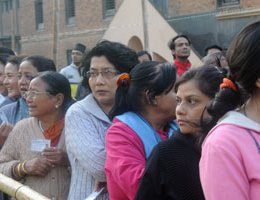
Growing excitement of youth in Nepal with regard to politics can be observed lately. Young people in general are believed to be frustrated with the old leadership style as well as their incompetence which has led to their increasing interest in politics. Youths today want to see better governance which is free from vested interest of few political leaders and cadres.
Many young citizens have been pronouncing their independent candidacy to run local election this time. Young people from different political parties are also eyeing these local government seats, so that they can alter the status quo in political affairs and development. Many of these aspirants seem frustrated with how the governance is run by old guards in the last 30 years of democracy. They are vying for positions like mayor or chairperson and deputy mayor or deputy chairperson in municipalities or rural municipalities, as these are key change-making positions at the home ground.
The election is going to be held in 753 municipalities and rural municipalities across the country in 77 districts on 30th Baishak 2079. Total of 35221 representatives will be elected which includes mayor, deputy mayor, ward chairperson and members. Each ward comprises a chairperson and four members.
For the upcoming election, there is a wave of young people running for various positions. Youths like rapper Balen Shah running for Kathmandu Metropolitan City (KMC), Sumit Kharel for Budhanilkantha Municipality, nurse Nitu Khadka for Baglung Municipality are few of such names. General public have been showing sympathy over these young minds mainly because of the frustration they have over old leaders who are already tried and tested, and many of whom have measurably failed as well in their service to the people.
These young minds have created a spark of hope among the younger population, comprising almost 60% voters under the age of 39 years. Further, candidacy from woman with the Miss Newa title holder Sunita Dangol who previously had decided to run independently is now running the local election from the CPN-UML has also created excitement and hope among other younger women to engage in active politics as well.
Political parties are believed to have heightened nepotism which has led to many young candidates to run independently in the upcoming election. Time and again it has been heard that political parties demand huge sums of donations or commissions to the aspiring candidates to contest the election from their party symbol and platform. The party tickets are focused merely on favouritism because of which a common individual to get a chance to file for mayor-like position is a far cry. On top of that, there is a lack of fair representation of women in all the leading political parties in the country which discourages competent women to try to run for elections through political parties rather they simply opt for independent candidacy. Independent candidacy seems to be a breakthrough and easy process for the common individual, especially aspiring young men and women to get into active politics and run for elections.
In 2017 election, Election Commission (EC) mandated that 40.4% of total nominees be women and also the nominations for chief and deputy chief put forth by each political party should be gender-neutral in nature, meaning if mayor's position is occupied by a male then deputy mayor should be a female or vice-versa. As a result of this, 40.9% of the seats were then occupied by females. This shows that political parties didn't nominate the women representatives voluntarily, rather they simply had to do it after EC compulsorily mandated them to do so. Further, when we research in-depth, we can find only 2 percent of the local governments across the country are actually headed by women (15 out of 753). This is a stark contrary against the constitutional right of so-called inclusive gender representation. Because of the results of the past elections, the political parties have this time supposedly tried to field many women, especially new faces of young women as the head of municipalities or rural municipalities.
Political analysts today have been arguing if being young and claiming to replace old leadership style is enough to create a pathway for development and modernization. They further argue that a proper, especially doable roadmap, plans and agendas need to be in place so as to convince the voters to garner the votes. Real issues like health, transportation, education needs to be focussed rather than having unrealistic agendas and goals. The new set of young people who have already pronounced their candidacy have been nicely and methodologically presenting their agendas and roadmaps, which generally touches the hearts of the young generation.
On the other hand, although the public has shown some sympathy to the young candidates, they do not seem fully convinced and confident that these youths can run the key positions successfully. History has been proof of that. In the 2017 local election, the then 21 year old Ranju Darshana ran for mayor position of Kathmandu Metropolitan City (KMC) as the youngest female candidate. Although there was overwhelming response from all quarters of society during the process, the final election result showed otherwise. This could be because voters have been deeply rooted in old beliefs and political ideologies and these mindsets are difficult to change. Also, once losing the elections, the young candidates just drop out from public service and change their profession, making them a bunch of unreliables. Every candidate needs to be well inculcated that the politics is a marathon race and not a sub gap arrangement while they have no other business to do! Politics demand continuity of public or social service, whether the candidates lose or become victorious, whichever the tide goes!
Political parties have a strong hold among the voters for a long time. On top of that, voters also believe that only when the young candidates have plans and agendas that can directly connect with the general public should they win the elections, if not gaining the trust of the voters is extremely difficult.
Young independent candidates on the other hand believe that political literacy has improved among the voters at present hence they are hopeful that the upcoming election will see some positive changes for the youths disregarding the past history of the local election.
Political scenario in Nepal is slowly changing. Younger people are making platforms for themselves to voice their opinion, assert in public service and show their prominence in politics. The most optimistic consideration for young people is that they are untainted and uncorrupted unlike their competitors! It is quite natural that the younger population are inclined towards the younger candidates, but having said that it is not just the youth voters but all age groups of voters who decide and choose who their leaders will be. It is true that Nepal has become the country of the young with more than half of the total population being that of youths and their participation in politics is imperative. But simply being a youth and running for election to replace old leadership is not enough. Youths need to make proper utilisation of their knowledge and education and have concrete plans and ideas in place so that the voters of all age groups are convinced that the youth are the leaders in present day scenario and context of a country like Nepal.
The author holds a Master of Science degree in Gender and Development Studies from the Asian Institute of Technology (AIT), Thailand.
- Turning The Tide: Addressing Gender Biases In Media
- Aug 25, 2021
- How COVID-19 Threatens The Future Of The Children, Especially Young Girls?
- Apr 25, 2021
- Women's Representation In Politics: Just A Tokenism
- Feb 06, 2021
- Women Migrant Workers And Their Human Rights
- Dec 27, 2020
- Human Rights Dimension To COVID-19 Response And Its Long-Term Effects
- Nov 27, 2020

















